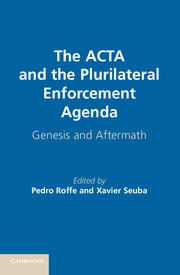Book contents
- Frontmatter
- Contents
- List of Contributors
- Foreword
- Acknowledgments
- Acronyms
- Introduction
- PART I THE FINAL ACT: ITS MAIN FEATURES AND CONTENTS
- PART II DOMESTIC LEGISLATIVE CHALLENGES
- PART III IMPACT ON RELATED PROCESSES
- PART IV VIEWS FROM STAKEHOLDERS: LESSONS
- PART V WHAT LIES AHEAD ACTA
- Annex I Anti-Counterfeiting Trade Agreement
- References
- Index
Foreword
Published online by Cambridge University Press: 05 December 2014
- Frontmatter
- Contents
- List of Contributors
- Foreword
- Acknowledgments
- Acronyms
- Introduction
- PART I THE FINAL ACT: ITS MAIN FEATURES AND CONTENTS
- PART II DOMESTIC LEGISLATIVE CHALLENGES
- PART III IMPACT ON RELATED PROCESSES
- PART IV VIEWS FROM STAKEHOLDERS: LESSONS
- PART V WHAT LIES AHEAD ACTA
- Annex I Anti-Counterfeiting Trade Agreement
- References
- Index
Summary
Intellectual property policies have existed for decades and in some instances for centuries. Until recently, however, they have been largely the domain of specialists, practitioners and producers of intellectual property rights (IPRs), and thus relatively insulated from the kind of debate common in most areas of public policy. IPRs are principally conceived as a tool to encourage innovation, but as firms perceive their intangible assets as crucial to the protection of their global competitiveness, their intellectual property (IP) interests have increasingly shifted towards stronger protection, to the detriment of any sustainable balance between private and societal interests.
It is against this background that the current debate on the enforcement of IPRs has emerged. Although the achievement of more effective IPR enforcement was already one of the main driving forces behind the conclusion of the Agreement on Trade-Related Aspects of Intellectual Property Rights (TRIPS), it increasingly appears that TRIPS – while being an important milestone – did not represent a conclusive and satisfactory response to what is perceived as a significant rise in levels of counterfeiting and piracy. In this context, recent years have witnessed an unprecedented proliferation of initiatives relating to enforcement of IPRs. Perhaps the most conspicuous and exposed attempt has been the proposed move towards the Anti-Counterfeiting Trade Agreement (ACTA).
- Type
- Chapter
- Information
- The ACTA and the Plurilateral Enforcement AgendaGenesis and Aftermath, pp. xiii - xviiiPublisher: Cambridge University PressPrint publication year: 2014

